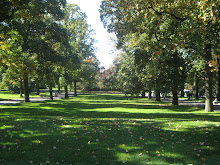
Ald. Ed Smith (28th), who grows vegetables of his own in East Garfield Park, said he loves that the neighbors are shoulder to shoulder."I think that's a good move. We need more people doing it. If people really talked about their concerns on their blocks and worked together to find a way to avert a lot of them, it would be much better," Smith said."It's one good thing [that] leads to other things. If growing gardens means sharing information, I think it's a good idea."Despite having one of the heaviest concentrations of drug dealing in the city—partly because of its proximity to the Eisenhower Expressway and the suburbs—residents are quick to say crime does not define all of Austin.
Urban gardens can change the focus of struggling communities, said Harry Rhodes, executive director of Growing Home, a non-profit organization dedicated to helping ex-convicts and homeless people rebuild their lives through urban farming."You can change from looking at unemployment and looking at what people don't have to looking at what people have. When you show people growing their own food, everyone eats," Rhodes said. "When you go in and you see green—you see flowers, you see gardens—it changes a whole community."




No comments:
Post a Comment